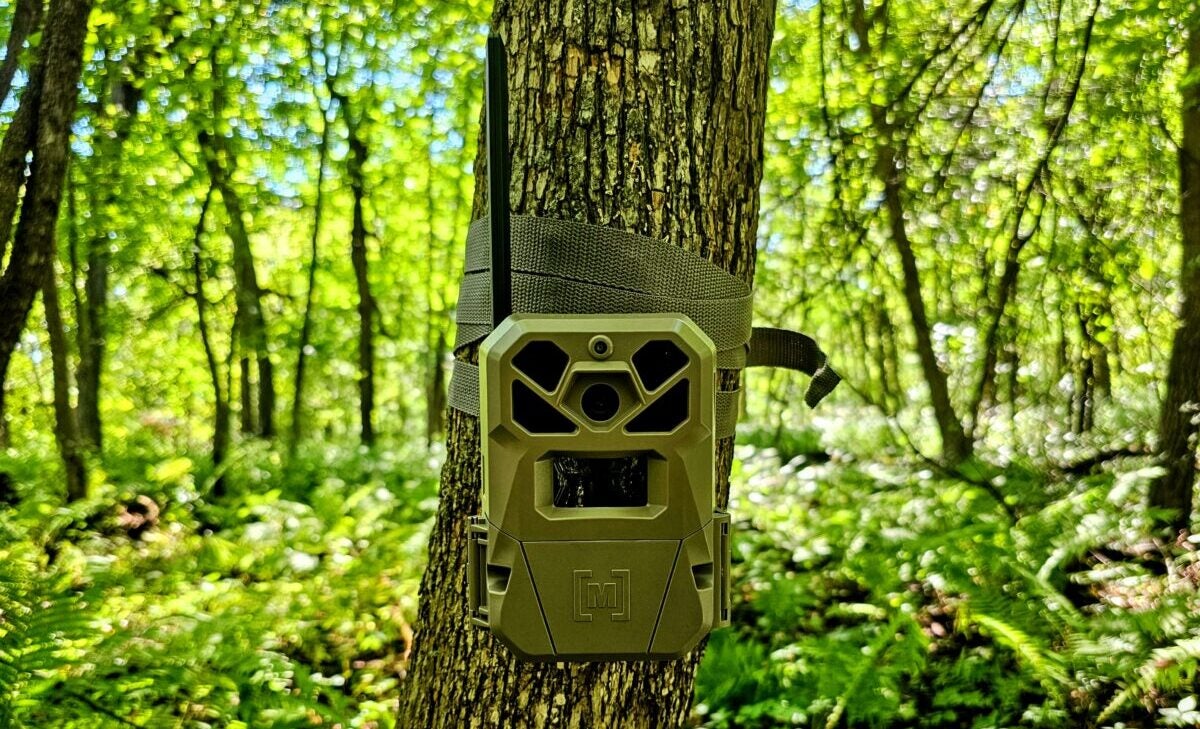As someone who’s spent years exploring trails, monitoring wildlife, and protecting property lines, I know how crucial a reliable trail camera can be. Over the past few months, I tested five of the most popular trail cameras to find out which ones actually perform when left out in the real world — rain, heat, and long nights included.
Each camera was mounted in similar environments — open field edges and wooded trails — to test trigger speed, photo clarity, night vision, weather durability, and battery life. Below, you’ll find my honest impressions, what I liked, what annoyed me, and who each camera is best suited for.
Quick Buying Questions Before You Choose
Ask yourself a few quick questions before buying a trail cam:
- Do you need cellular connectivity to receive images on your phone?
- How important is battery life and low maintenance for you?
- Are you tracking fast-moving wildlife, or just monitoring a feeder?
- Do you need video, or are still photos enough?
- Will the camera stay outdoors all year, or just for a hunting season?
Your answers to these will determine whether you should invest in a premium cellular model or stick with a dependable SD-card unit.
Trail Camera Types
| Type | Best For | Typical Features |
|---|---|---|
| Cellular (4G/LTE) | Remote monitoring, property security | Sends images to your phone, remote setup, requires a data plan |
| Wi-Fi / App Cameras | Short-range transfer, local control | Wi-Fi or Bluetooth transfer, great for nearby setups |
| SD Card (Non-Cellular) | Long battery life, budget-friendly | Saves images locally, no data fees |
| Low-Glow IR | Balance between stealth and night range | Red LED glow with longer IR reach |
| No-Glow IR | Total stealth for skittish animals | Invisible IR, slightly shorter night range |
Our Top Picks by Category
| Category | Our Pick |
|---|---|
| Best Overall Cellular | Moultrie EDGE 2 Cellular Trail Camera |
| Best Budget Cellular | SPYPOINT Flex-M Cellular Trail Camera |
| Best Budget Non-Cellular | Stealth Cam Browtine 16MP Trail Camera |
| Best Mid-Range Scouting | Browning Command Ops Elite 20 BTC-4E20 |
| Best Wi-Fi/Bluetooth Camera | GardePro E6 Trail Camera WiFi 48MP |
Hands-On Reviews
Moultrie EDGE 2 Cellular Trail Camera
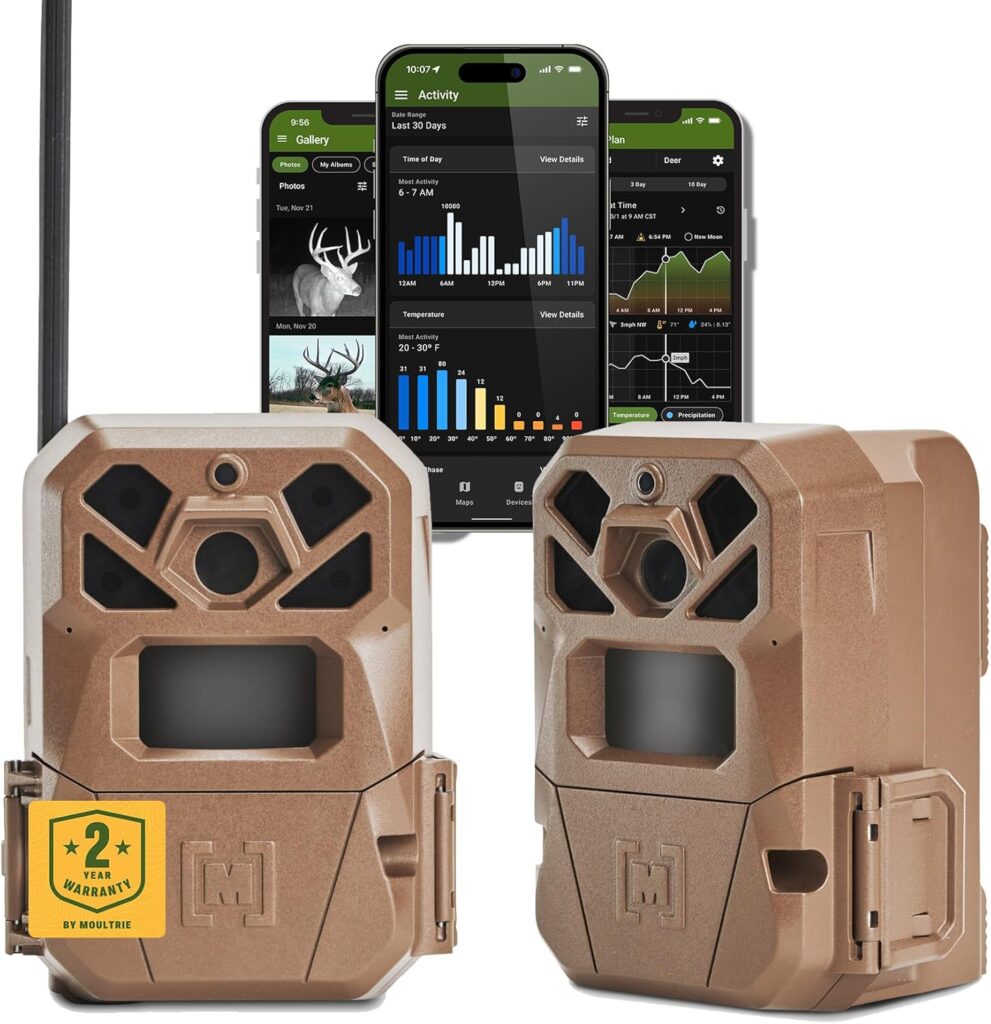
Best for: Hunters and property owners who want reliable, real-time photo delivery.
Tested by: Me — field use for 6 weeks across changing weather.
Why We Like It:
The Moultrie EDGE 2 performed impressively during my tests. Setup through the Moultrie Mobile app was straightforward, and it delivered crisp 36MP photos with true color and minimal blur. I received cellular uploads almost instantly, and the app’s detection mapping was genuinely useful for pattern tracking.
Pros
- Excellent image clarity and 1080p video with audio.
- Fast and reliable cellular delivery.
- Great app interface and weather-resistant build.
Cons
- Requires a paid cellular plan for continuous uploads.
- Slightly heavier than compact non-cellular cams.
- Premium pricing compared to basic SD models.
SPYPOINT Flex-M Cellular Trail Camera
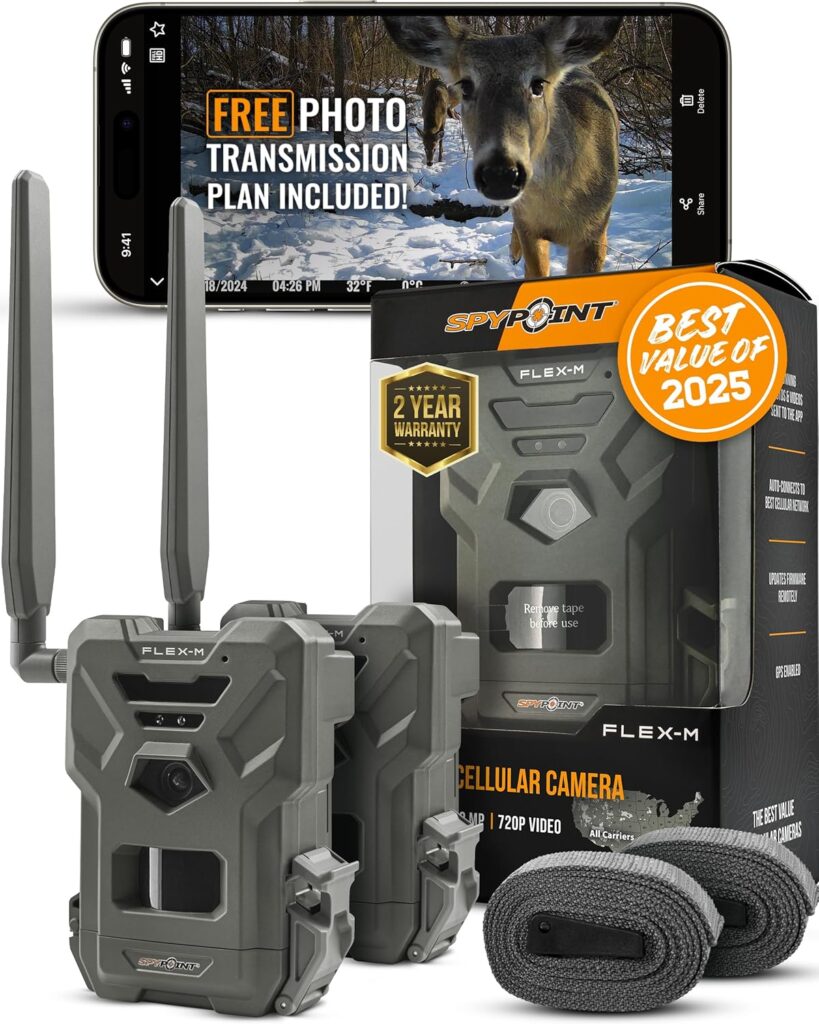
Best for: Budget-conscious users who still want cellular access.
Tested by: Me — twin-unit setup for connectivity testing.
Why We Like It:
The SPYPOINT Flex-M is a pleasant surprise at its price point. The dual-SIM technology automatically finds the best cellular signal, so I never lost connection. Photos looked solid even at lower megapixel settings, and upload times were quick. It’s ideal for users who want a reliable, easy-to-use cellular camera without spending a fortune.
Pros
- Affordable yet fully cellular.
- Compact design, easy to mount.
- Dual-SIM ensures better network coverage.
Cons
- 720p video is limited.
- Night images could be sharper.
- Frequent uploads drain batteries faster.
Stealth Cam Browtine 16MP Trail Camera
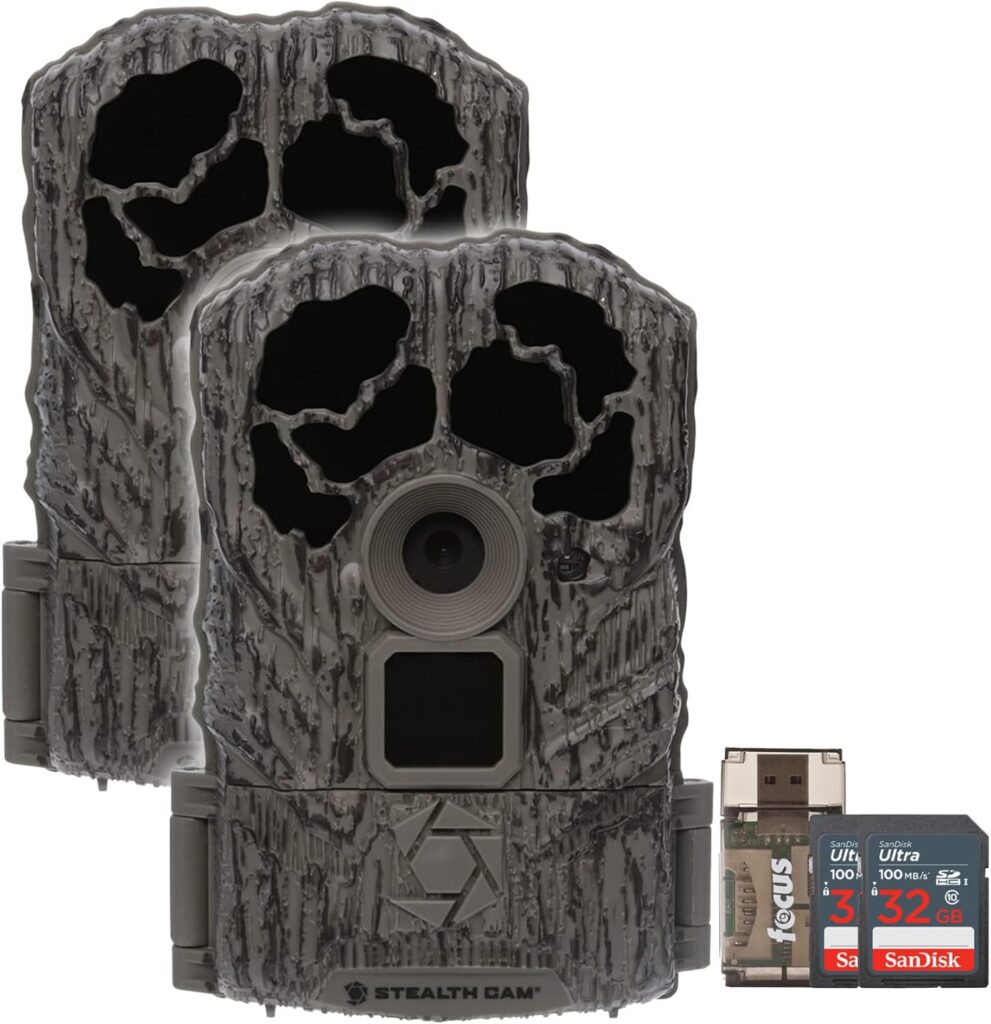
Best for: Beginners or anyone needing an affordable, no-hassle camera.
Tested by: Me — two units on different trails.
Why We Like It:
Simple, effective, and inexpensive — the Stealth Cam Browtine gets the job done. The 16MP photos were surprisingly sharp for such a low-cost device, and setup was dead simple. It doesn’t have fancy connectivity, but it’s dependable and rugged enough for long outdoor use.
Pros
- Excellent value for the price.
- Easy setup and consistent triggers.
- Comes bundled with SD card and reader (depending on listing).
Cons
- Lacks cellular features.
- Nighttime IR range is average.
- Plastic housing feels lightweight.
Browning Command Ops Elite 20 BTC-4E20
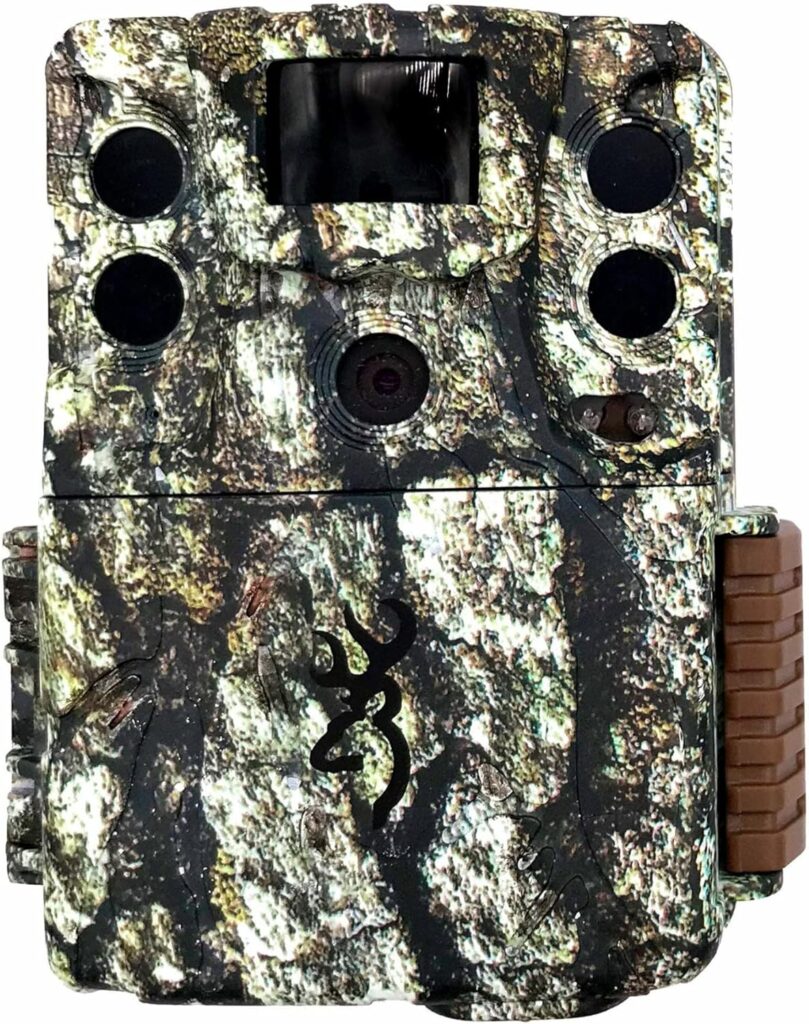
Best for: Long-term scouting with dependable performance.
Tested by: Me — mounted in forest clearing for two months.
Why We Like It:
Browning’s cameras are known for rugged dependability, and the Command Ops Elite 20 is no exception. It delivered 20MP images with natural colors and almost zero false triggers. The battery life is outstanding — I ran the same set of lithium AAs for the entire test without replacement.
Pros
- Long battery life.
- Quick trigger and excellent image consistency.
- Simple menu navigation.
Cons
- No cellular features.
- Night photos could be brighter.
- Slightly basic latch design.
GardePro E6 Trail Camera WiFi 48MP
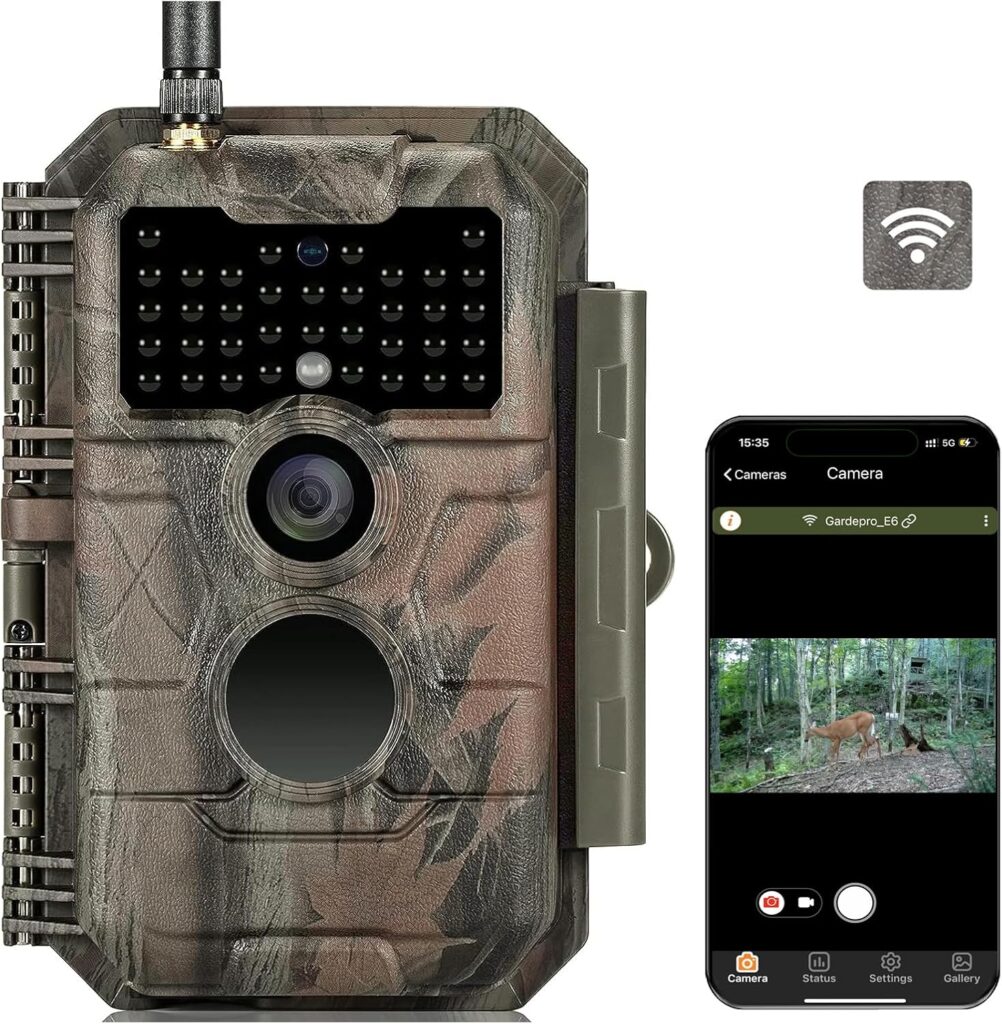
Best for: Users who want high-resolution stills and wireless access nearby.
Tested by: Me — short-term deployment near cabin.
Why We Like It:
The GardePro E6 delivers impressive image resolution for its price, with 48MP stills and 1296p HD video. I liked its Wi-Fi and Bluetooth connectivity — it made retrieving images easy without removing the SD card. Perfect for users who check their cameras frequently or want easy data transfer.
Pros
- Very high resolution and detailed video.
- Wi-Fi/Bluetooth connectivity for local transfer.
- Waterproof and durable housing.
Cons
- Not a cellular camera.
- Battery life drops quickly with frequent Wi-Fi use.
- App connectivity can be spotty at longer distances.
Other Things to Consider
- Battery Life: Cellular models consume more power; lithium batteries or solar panels help extend use.
- Storage: Always use high-endurance SD cards (32–128GB).
- Trigger Speed: For fast wildlife, look for <0.3s trigger time.
- Night Vision: Choose low-glow for distance, no-glow for stealth.
- Subscription Costs: Cellular cameras usually require a monthly plan.
- Weather Resistance: IP66+ is ideal for long-term outdoor use.
- Accessories: Mounting straps, tree brackets, and lock boxes improve camera stability and safety.
Frequently Asked Question
Q1. Do I really need a cellular trail camera?
Cellular cameras like the Moultrie EDGE 2 or SPYPOINT Flex-M are ideal if you want real-time updates or can’t frequently visit your camera site. However, if you check your locations often, a simple SD-card model like the Stealth Cam Browtine will save you money and maintenance.
Q2. How long do batteries last in trail cameras?
Battery life varies widely. Non-cellular models such as the Browning Command Ops Elite 20 can last for months on one set of lithium AAs, while cellular cameras may last a few weeks depending on photo upload frequency. Use lithium batteries and reduce transmission intervals to extend runtime.
Q3. What affects night photo quality?
Night image quality depends on IR flash type, battery strength, and camera placement. No-glow IR cameras are stealthier but may produce dimmer images. Low-glow IR, like in the Moultrie EDGE 2, offers longer range and brighter shots. Always clear nearby branches that can reflect IR and cause overexposure.
Q5. Which model is best for low-maintenance setups?
If you want to “set it and forget it,” the Browning Command Ops Elite 20 or the Stealth Cam Browtine are perfect — both offer great battery life and simple SD storage with minimal upkeep.
Conclusion
After testing these cameras in the field, my clear favorite for all-around performance is the Moultrie EDGE 2 — it’s dependable, high-quality, and easy to use. If you want cellular convenience without the premium price, the SPYPOINT Flex-M is the best value option. For pure affordability, go with the Stealth Cam Browtine. Hunters who prioritize long-term use and battery efficiency will appreciate the Browning Command Ops Elite 20, while the GardePro E6 is great for tech-savvy users who want Wi-Fi access and ultra-sharp images.
Whatever your need — scouting deer, securing property, or simply enjoying wildlife photography — one of these five trail cameras will fit your lifestyle and budget perfectly.

